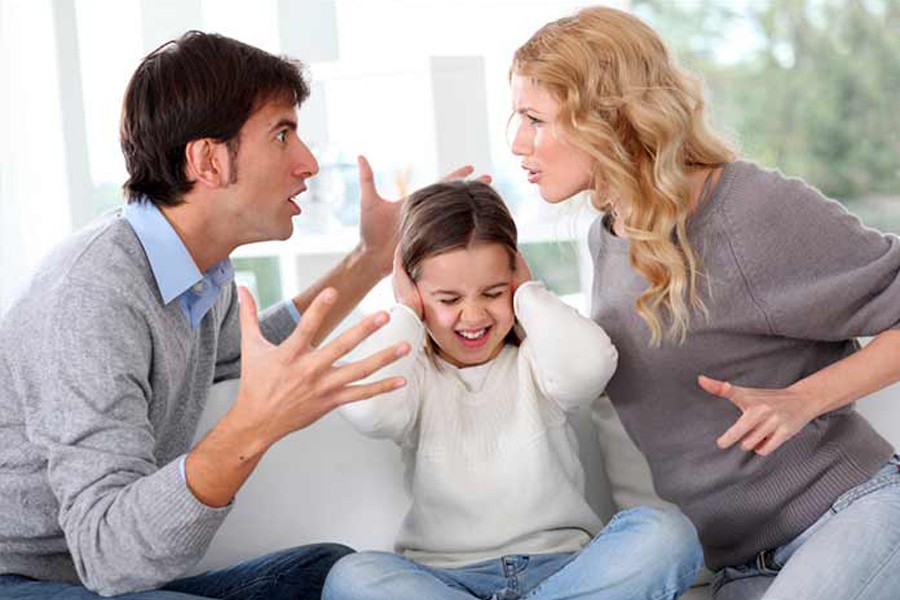Parents are the first teachers of kids. They are heroes and mentors to them. Kids learn everything from their parents. They learn by observing their parents, even when those aren't intentionally trying to teach them anything. Growing kids are just the reflection of their parents. So good parenting or teaching is mandatory for kids' sound socio-psychological development.
Good parenting is a powerful skill. We develop this skill by various means such as modelling it on the parenting style of our own parents, from our experience of watching other parents, and information from other formal and informal sources. A healthy 'child-parent' relationship is vital for children's mental health.
Overt family conflicts, frequent aggression, anger outbursts and impaired family relationships have long-term disastrous effects on the physical and mental health of children.
A home is a child's reliance of love and care. If children see parents constantly fighting and arguing at home, it creates a sensation of panic within their mind. They feel frightened and helpless. These feelings of vulnerability and insecurity can shape a child's personality later.
Parents may believe they are giving their children all the love they need, but they send a conflicting message when they fight with each other. Kids' mind is highly sensitive to the interaction between parents, especially during infancy and early childhood.
A child may see his or her parents fight constantly, but sleep in the same bed every night. These contradictory activities put a wrong message to the child's thought. When a child is left with such unexplained contradictions, he or she often comes up with an incomplete or incorrect conclusion.
What's fascinating is that conflicts between parents have more of an impact on the relationship between a father and his child than a mother and her child. A study by the University of York has found that the children of divorced parents are more damaged by the arguments that occurred during the marriage, than by the split itself.
On the other hand, seeing their parents fighting and arguing, children also start to believe that this is the way to solve problems. Thus, they try to resolve their issues in the same way with everyone in their adult life.
Who are the most vulnerable?
Children of all ages can be affected by destructive inter-parental conflict. A child as young as a 6-month old baby can be negatively affected by harsh parental arguments. A baby shows higher physiological symptoms of distress, such as an elevated heart rate, in response to an overt inter-parental conflict.
There are few of the signs which indicate that a child is affected by his parents' fighting:
1) The child becomes absolutely quiet.
2) Starts crying the minute he sees his parents arguing.
3) Looks scared when he sees his parents shout and yell at each other.
4) Blames himself when his parents start to argue and fight.
5) Tends to fight with his peers and not get along with other kids.
6) Shows signs of depression, being away from his parents, self harm, suicidal attempt.
7) School and other extra-curricular activities slow down.
8) May frequently complain of headaches, stomachaches or some other health issues to divert the parents' attention from fighting.
What is a bad effect seen in children in the adult life?
1) The child becomes reckless, aggressive, garrulous constantly.
2) Had more difficulty regulating their attention and emotions.
3) Unable to concentrate on studies, kids' mind is pre-occupied with conflicts.
4) Increased relationship problems, behaviour problems lead to conduct disorder later.
5) A child becomes depressed, develops deliberate self harm and commits suicide.
6) Increased difficulty in adjusting to school in children.
7) Suffers from eating disorders, headaches or stomachaches and sleep problems.
8) Increased risk of substance abuse, smoking, binge drinking, and marijuana use.
What parents should do?
Where there is genuine love and care, there is no room for ego! So-
- Respect each other in front of your children.
- Never fight in front of your children.
- Don't create a situation which would require your child to take sides.
- Be mindful of the language and tone you use with each other
- Talk to children about arguments and differences in opinions.
- Don't involve your children when you are arguing with each other. Don't make it about them
- If you do happen to fight in front of your children, show them how to resolve conflicts.
- Keep ego out of the argument and never play the blame game.
If disagreement unavoidable, you might take these steps:
1) Reassure the children that it was just an argument.
2) Discuss the fight.
3) Finish it up by making sure the children understand that you're still a strong family.
4) Try to resolve your arguments when they first start to arise.
6) Try to not lose your temper in front of your child, and apologise when you do.
7) Make sure never to involve the child in your arguments.
8) Avoid talking ill about a person in front of your child. Refrain from using bad language. Use a calm tone and talk out your problems.
Conflicts and disagreements are part of conjugal life. It is completely understandable that a couple can have disagreements, but the important thing is to work them out amicably and come out with constructive solutions.
Parents must understand how their fighting can affect their children's well-being, world-views and personality; this is why they must ensure that all fighting and arguing in front of children is done in a manner that does not affect them adversely.
Dr. Muhammad Sayed Inam, MBBS (DMC). M.Phill (psychiatry), is a psychiatrist in Bangladesh. He is a member of American Psychiatric Association, European Psychiatric Association and American Academy of Neurology. He is a life member of Bangladesh Association of Psychiatrists.
[email protected]


